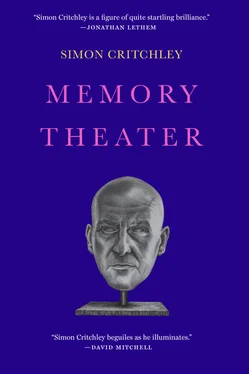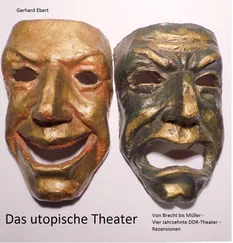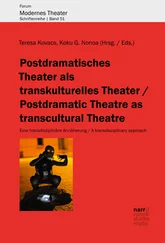I tried to resist looking through at the center of the circle, with the date of my death. But there it was: “le 13 Juin, 2010, 1551h, Den Bosch, hémorragie cérébrale.” Cerebral hemorrhage. OK. I was expecting lung cancer. But where the fuck was Den Bosch?
* These individuals have been informed. After correspondence with them, it became clear that none of them were known to Michel’s family, which possibly explains why the boxes were sent to me in 2004. The charts are in the special collections room in the University of Essex library along with Michel’s other works, but they are sealed until the time of my own death.
Initially, the news didn’t affect me much. Rather like Wittgenstein receiving word of his terminal cancer with great relief, I found some solace in knowing exactly when I would die. I simply decided to put the whole incident out of my mind. It worked. I spent the next days packing my books and emptying my office. I met with Robert twice and was evasive when asked about the memory maps. We arranged for a small Michel Haar archive to be established at the university, and I would write an introductory text for the library website. I took my memory map and a handful of Michel’s manuscripts with me and returned to the gloriously suffocating heat of my first summer in New York City.
At first, everything was fine. I told no one about the map, for shame at taking seriously such superstitious nonsense. It was my dirty little secret. I decided to commit myself quietly to fulfilling my fate. It was all terribly easy. The writing of books and papers flowed in exactly the sequence that Michel had predicted without even willing them into being. I slept well. I had a series of enlivening and transient relationships. I did my job well and was popular at work. I lived contentedly in my spacious one-bedroom apartment in Cobble Hill, Brooklyn. I did a wonderful job at concealing the anxiety which unconsciously consumed me. Time passed.
In 2007, I was awarded a fellowship at the Getty Research Institute in Los Angeles and spent the year in the comfortable sterility of Brentwood, just west of the 405 freeway, on Sunset Boulevard. I drove a silver Volkswagen Passat and had an office overlooking the Pacific Ocean, a compliant research assistant, and the use of the UCLA library. In seven months, I had written my book on how philosophers die. It was funny, full of impressively wide reading, and utterly shallow. Prior to the financial collapse of 2008 and the withering of the publishing industry, I made decent money on book deals and rights sales. Pleased with myself, I returned to New York for another round of teaching, commitment-free relationships, and vacuous socializing. I even started doing yoga. I thought about writing a book on happiness. My newly acquired agent thought it would be a great idea. Thoughts without a thinker. Cool.
In January 2008, during a bitterly cold day when it was almost too painful to inhale the winter air, a box was delivered to my place by UPS and left in the hallway. When I got back that evening, I saw that it had been sent by Barbara at Essex. It was clearly the missing box, Taurus . Smaller than the others. It sat on my desk all night. A strange fear ran through me, preventing the beautifully dreamless sleep I had enjoyed since getting back from Los Angeles. I called Barbara the next morning and she said that the box had just turned up unannounced, addressed to me as before, with no letter or explanation.
I got back from work that evening around 7:00 p.m. and began to drink freely, staring blankly at the box. I inspected it carefully, handling the box gingerly. Something shifted when I turned it on its side. I slit the wrapping tape very carefully with a Stanley knife and opened the box. Underneath a pile of Alsatian newspapers was a circular wooden object, about a foot and a half in diameter and eight inches high. The top lifted off to reveal a tiny auditorium full of painted figures on seven elevated rows with the amphitheater divided by seven tiny gangways. It was a maquette of Giulio Camillo’s memory theater. It was exquisite. I retrieved my copy of The Art of Memory and began to look at the illustrations. Was this the original model that Camillo had used to persuade the king of France to become his patron?
My landlady’s family owned an antiques business, mainly importing repro stuff from Italy. Business was bad. I showed her father the theater some days later. Any suggestion of antiquity was quickly dismissed. He disassembled the base of the theater to reveal the carpenter’s mark, the initials “D.M.” and a date, 1986—the year after Mongin had completed Michel’s memory map. The maquette was a reproduction, probably assembled in Paris from descriptions in Yates and some drawings in the Bibliothèque Nationale. I’d seen some of the latter in an obscure edition of Camillo that I had bought from Rudi Thoemmes Rare Books in Bristol.
The theater sat on a table beside my bed for weeks. I liked to feel it close by. Oddly reassuring. That was when the hallucinations began. Difficult to explain. Embarrassing. I began to experience inexplicable pains in my body, something like growing pains, moving within me against my will. It made any concentration impossible. I would lie facedown on the floor and feel the pain in my body move from organ to organ. Belly pain. Kidney pain. Brain pain. Lung pain. I felt like a body bag of organs. This would go on for hours.
Next, my visual perception seemed to be affected by all sorts of marginal encroachments. It felt like interference on an old-fashioned T.V. set. Suddenly, when walking down the street, I would see something moving or flying quickly in the far corner of my visual field. I would turn my head to look, but it was gone. Things got worse, to the point where the perceptual surface of the world began to warp and bend. It was like being in a hall of mirrors. Or in a movie adaptation of a Philip K. Dick short story. This was accompanied with a massive increase in my tinnitus and strange auditory effects, like the sound of rain, or wind, or leaves, or distant muttering voices.
A week later and I was hallucinating wildly on the subway, seeing doubles of myself or watching strange animals, reminiscent of grotesque carvings in Gothic cathedrals, float around the subway car. Were they angels? Were my body and perception being invaded by some alien force? Was God punishing me? In order to reduce the massive levels of anxiety I was feeling, I began to disengage from the world. I went into the city just twice a week to teach and returned home immediately. Then, one evening during a lecture I was giving in early April, I experienced the most terrifying auditory hallucinations. A cacophony of voices engulfed me and then the furniture in the lecture theater began to elevate. I became convinced that everyone in the room, including myself, was dead. I could smell my own flesh rotting. Terrified and covered in shame, I gathered my things from the office, left the building, and never returned.
Alone for weeks on end, I started to think that my computer was attacking me and began to keep a careful log of events. I called it electronic harassment (EH). Here is a sample log entry transcribed from the longhand version written in pencil in order to minimize technological contact:
EH 04/17/08: 7:45 a.m. Steady heart pain at computer. 8:13 a.m. Choking shots to throat at computer from west. Sting shots to genitals same. 9:11 a.m. Seven stab shots to appendix area at computer from west. 9:16 a.m. Sneezing shots to nose at computer from west. Frenzied activity. 10:51 a.m. Seven stab shots to left side above hip at computer from east. 11:18 a.m. Intense, persistent pain attack on right side at computer from north. No pain-free moments all morning. Ache all over. 12:12 p.m. Focus on eyes at computer and in kitchen from west and south respectively. 12:15 p.m. Pulse shots to ear at computer from south. Liquid wax emission. Stab shot to left shoulder at computer from east. Next north. Teamwork. 12:19 p.m. Pulse shots to left kidney. 1:16 p.m. Lingering ache in area of left kidney from persistent deep pain attacks, mainly from east. Unable to read or write or concentrate. My body is Coventry Cathedral under German bombs. A bombsite. Melanie Klein. 3:33 p.m. Focus on eyes and genitals at computer from west. Repeated diarrhea emission. 3:44 p.m. Nuisance itch shots to face at computer from west. Rash on the skin behind my ear. Red boils under the hairline. Diarrhea again. 4:00 p.m. Choking throat shots at computer from west. Also deep stomach pain attack. 6:18 p.m. Stab shots to right kidney from roof terrace. Left side ache on couch from north. 8:58 p.m. Deep chest pain (heart) on couch from east. Assassins. 10:09 p.m. Strong stab shot to left shoulder from roof terrace from north. 11:35 p.m. Deep pain muscle shots from all directions. Cramps. 12:48 a.m. Brain flashes enter the repertoire. At least a dozen in bed. Profoundly disorientating. Brief bursts of painless sensation in the head, followed by disorientation. 3:48 a.m. Staggering, stumbling, occasionally falling. Toilet. Thirsty. EH log end.
Читать дальше












